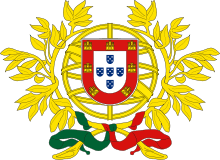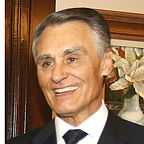Portuguese legislative election, 1985
| | |||||||||||||||||||||||||||||||||||||||||||||||||||||||||||
| |||||||||||||||||||||||||||||||||||||||||||||||||||||||||||
| |||||||||||||||||||||||||||||||||||||||||||||||||||||||||||
| |||||||||||||||||||||||||||||||||||||||||||||||||||||||||||
| Portugal |
 This article is part of the series: |
The Portuguese legislative election of 1985 took place on 6 October. In June of the same year, the former Prime-Minister, Mário Soares, had resigned from the job due to the lack of parliamentary support, the government was composed by a coalition of the two major parties, the center-right Social Democratic and the center-left Socialist, in what was called the Central Bloc, however this was an unstable balance of forces and several members of each party opposed such alliance. The new leader of the Social Democratic Party, Cavaco Silva, elected in May, was among those that never supported such alliance, and short after being elected leader of the party made the coalition fall in July.
A new election was called by the President and the Social Democrats won with a short majority and Cavaco became the Prime-Minister. The election was the first of three consecutive election victories for the Social Democratic Party. Meanwhile, a new party had been founded by supporters of the President Ramalho Eanes, the Democratic Renewal Party, led by Hermínio Martinho that surprisingly gained 45 MPs in the election and became the parliamentary support of the Cavaco's government until 1987, when it removed its support, making Cavaco fall. The Communists and the Socialists lost votes and MPs and the left would only return to the government ten years later, in 1995.
Parties
The major parties involved and the respective leaders:
- United People Alliance (APU), Álvaro Cunhal
- Socialist Party (PS), Almeida Santos
- Democratic Renewal Party (PRD), Hermínio Martinho
- Social Democratic Party (PSD), Cavaco Silva
- Democratic and Social Center (CDS), Lucas Pires
Aníbal Cavaco Silva, leader of the Social Democratic Party, was nominated Prime Minister for the first time.
Opinion Polling
The following table shows the opinion polls of voting intention of the Portuguese voters before the election. Those parties that are listed are currently represented in parliament. Included is also the result of the Portuguese general elections in 1983 and 1985 for reference.
| Date Released | Institute | Socialist | Social Democratic | United People Alliance | Democratic and Social Centre | Democratic Renewal | Lead |
|---|---|---|---|---|---|---|---|
| 6 October 1985 | Election Results | 20.8% 57 seats |
29.9% 88 seats |
15.5% 38 seats |
10.0% 22 seats |
17.9% 45 seats |
9.1% |
| 6 October 1985 | Exit Poll - RTP1, 22:50h | 22.0% – 26.9% | 26.8% – 29.7% | 15.0% – 18.1% | 9.3% – 10.8% | 14.5% – 16.5% | 2.8% – 4.8% |
| 6 October 1985 | Exit Poll - RTP1, 21:10h | 23.8% – 26.9% | 28.0% – 29.8% | 17.3% – 18.1% | 9.8% – 10.7% | 11.1% – 14.9% | 2.9% – 6.0% |
| 6 October 1985 | Exit Poll - Rádio Comercial | 19.0% – 22.0% | 29.0% – 31.0% | 14.0% – 16.0% | 8.0% – 16.0% | 18.0% – 22.0% | 9.0% – 10.0% |
| 4 October 1985 | Expresso | 28.0% – 32.0% | 27.0% – 31.0% | 15.0% – 17.0% | 9.0% – 12.0% | 8.0% – 11.0% | 1.0% |
| 25 April 1983 | Election Results | 36.1% 101 seats |
27.2% 75 seats |
18.1% 44 seats |
12.6% 30 seats |
— | 8.9% |
National summary of votes and seats
| Parties | Votes | % | ± | MPs | MPs %/ votes % | |||||||||
|---|---|---|---|---|---|---|---|---|---|---|---|---|---|---|
| 1983 | 1985 | ± | % | ± | ||||||||||
| Social Democratic | 1,732,288 | 29.87 | 75 | 88 | 35.20 | 1.18 | ||||||||
| Socialist | 1,204,321 | 20.77 | 101 | 57 | 22.80 | 1.10 | ||||||||
| Democratic Renewal | 1,038,893 | 17.92 | — | — | 45 | — | 18.00 | — | 1.00 | |||||
| United People Alliance[A] | 898,281 | 15.49 | 44 | 38 | 15.20 | 0.98 | ||||||||
| Democratic and Social Centre | 577,580 | 9.96 | 30 | 22 | 8.80 | 0.88 | ||||||||
| People's Democratic Union | 73,401 | 1.27 | 0 | 0 | 0.00 | 0.0 | ||||||||
| Christian Democratic Party | 41,831 | 0.72 | 0 | 0 | 0.00 | 0.0 | ||||||||
| Revolutionary Socialist Party | 35,238 | 0.61 | 0 | 0 | 0.00 | 0.0 | ||||||||
| Workers' Communist Party | 19,943 | 0.34 | 0 | 0 | 0.00 | 0.0 | ||||||||
| Workers Party of Socialist Unity | 19,085 | 0.33 | 0 | 0 | 0.00 | 0.0 | ||||||||
| Communist Party (Reconstructed) | 12,749 | 0.22 | 0 | 0 | 0.00 | 0.0 | ||||||||
| Total valid | 5,653,610 | 97.49 | 250 | 250 | 100.00 | — | ||||||||
| Blank ballots | 48,709 | 0.84 | ||||||||||||
| Invalid ballots | 96,610 | 1.67 | ||||||||||||
| Total (turnout 74.16%) | 5,798,929 | 100.00 | ||||||||||||
| A Portuguese Communist Party (35 MPs) and Portuguese Democratic Movement (3 MPs) ran in coalition.[3] | ||||||||||||||
| Source: Comissão Nacional de Eleições | ||||||||||||||
References
External links
See also
| ||||||||||||||||||||||||||

